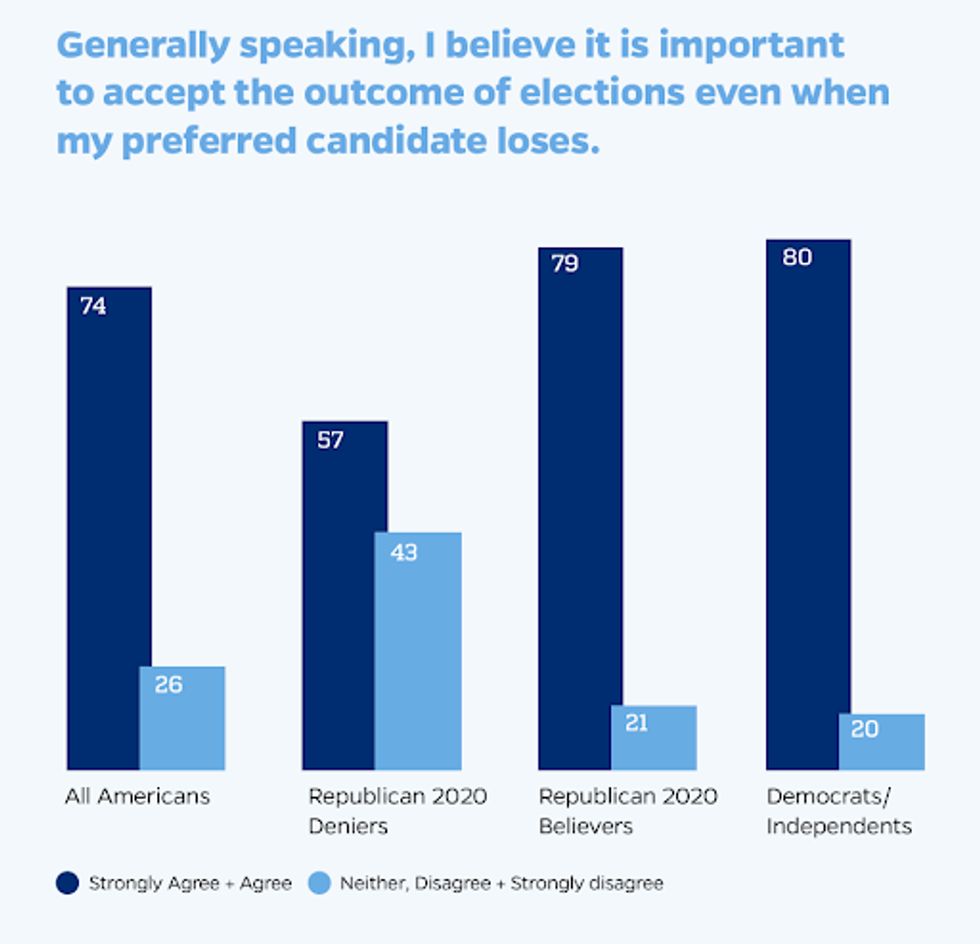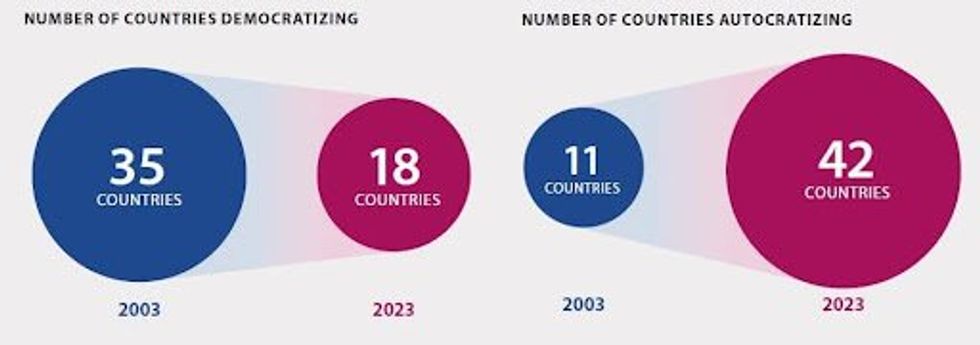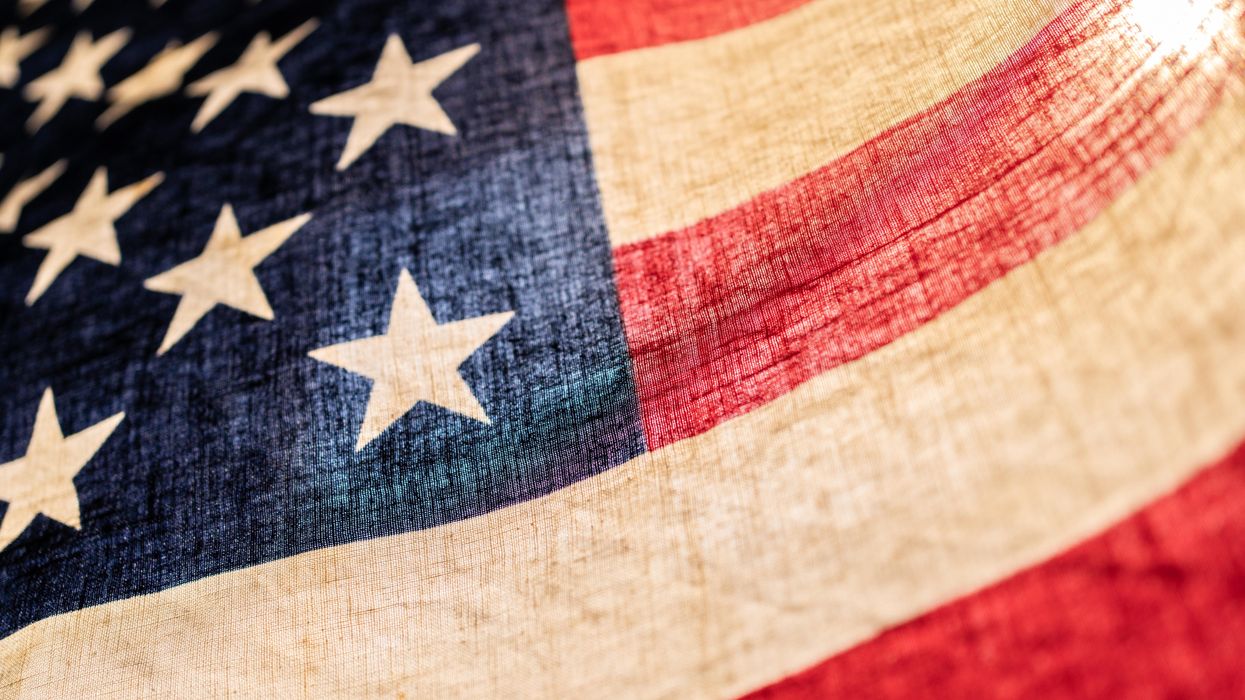Becvar is co-publisher of The Fulcrum and executive director of the Bridge Alliance Education Fund.
There is an ever-growing repository of research on the behaviors and beliefs of Americans related to bridge-building, polarization and our institutions. The proliferation of interest in these critical areas is wonderful, but can also feel overwhelming to keep track of and understand.
In the past month, scholars, practitioners, and pollsters have published some particularly timely and notable articles and polls relevant to the healthy democracy movement. Analyzing some of them to share this week, I noted that they seemed to fall into three main themes, but with a wide breadth of issues tackled.
Engagement and participation in democratic processes
“ What motivates bridge-building across pernicious group divides? ” The article by Peter Coleman and Lan Phan explores the dynamics of engaging Americans across political and racial divides in bridge-building activities, emphasizing the role of motivational framing. Through six studies, it examines how framing these activities in terms of prevention (avoiding negative outcomes) or promotion (achieving positive outcomes) can influence participation.
Results indicate that fitting the framing to individuals' motivational orientation increases willingness to engage in bridge-building. The studies also uncover significant differences in motivation based on political affiliation, race,and gender, with findings suggesting that promotion-oriented framing particularly resonates with participants, regardless of demographic differences.
“ Understanding Pro-Democracy Conservatives ”: The report by the SNF Agora Institute at Johns Hopkins University explores the contours of a conservative pro-democracy movement in the current American political landscape. It focuses on the importance of engaging conservatives in democracy reform efforts, traditionally dominated by the left, highlighting the political and personal costs for right-of-center individuals in these activities.
A Gallup poll categorizes Americans into three groups based on their views of the 2020 election's legitimacy. It examines these groups' characteristics, news consumption habits, beliefs about misinformation and political identity. The report finds that pro-democracy conservatives, who believe in the legitimacy of the 2020 election or are unsure, display unique political profiles, including more traditional information sources, progressive societal perspectives, and a stronger belief in democratic values compared to their counterparts who deny the election's legitimacy.
 "Understanding Pro-Democracy Conservatives"
"Understanding Pro-Democracy Conservatives"
“ Growing Racial Disparities in Voter Turnout, 2008–2022 ”: The Brennan Center's report reveals a widening gap in voter participation between Black and white Americans, particularly in regions formerly covered by Section 5 of the Voting Rights Act. This trend has been increasing since 2012, with the gap expanding more rapidly in areas affected by the Supreme Court's 2013 Shelby County v. Holder decision. The report underscores the impact of restrictive voting laws and practices on the turnout of voters of color, emphasizing a growing concern for democracy and participation equality across the United States.
Challenges to democratic health and functioning
“ Map the System - Political Polarization Report ”: In partnership with the Institute for Youth in Policy, the 2024 “Map the System” report by Vanderbilt University's Innovation Center delves into the escalating issue of political polarization in the United States. It outlines the multifaceted nature of polarization, highlighting the role of political elites in exacerbating divisions and the demographic shifts within major political parties.
Employing a design-thinking methodology, the study gathers insights through scholarly research and interviews with 15 stakeholders to explore the roots of political polarization and propose potential levers for change, including electoral reform, media literacy and enhanced civic education.
“ Most say democracy is essential for the U.S. identity, but few think it is functioning well ”: The AP-NORC poll highlights a significant gap between the value Americans place on democracy and their perception of its functioning within the United States. While three-quarters believe a democratically elected government is crucial to the country's identity, only 21 percent see democracy as the best form of government, and 53 percent think it's working poorly.
The study also explores views on the Constitution and democratic values, revealing partisan differences and a general skepticism towards political institutions and leaders upholding democratic principles.
“ Violence and Democracy Impact Tracker: March 2024 Update ”: The most recent update from this joint initiative from Protect Democracy and the SNF Agora Institute at Johns Hopkins University evaluates political violence's effect on U.S. democracy, categorizing impact levels from well-functioning democracy to non-democratic systems. It highlights significant concerns about threats to public officials, institutional breakdowns, authoritarianism and electoral process violence.
Experts' consensus points to considerable, though not imminent, risks to democracy, particularly emphasizing election integrity and the erosion of democratic norms.
Public support for democratic values amid challenges
“ Uncommon and nonpartisan: Antidemocratic attitudes in the American public ( Penn Today on the article): This research is from the cross-institution team of Derek Holliday, Shanto Iyengar, Yphtach Lelkes and Sean Westwood. They find that despite the recent undermining of democratic norms by prominent Republican officials, the American public largely opposes such violations, showing bipartisan support for democracy. Analyzing data from extensive surveys, the study reveals no significant increase in antidemocratic attitudes among the general populace despite high levels of political polarization and divisive rhetoric.
It suggests the main threat to American democracy stems from elite actions, not widespread public support for antidemocratic behaviors. The findings highlight a disconnect between the behaviors of Republican elites and the democratic values of their constituents, emphasizing that public opinion remains committed to democratic principles regardless of partisan affiliation.
“ Democracy Winning and Losing at the Ballot ”: The 2024 V-Dem Democracy Report reveals ongoing autocratization in 42 countries, impacting 35 percent of the global population, with democracy declining to levels last observed in 1985. Conversely, democratization is noted in 18 countries, representing 5 percent of the population. The report highlights significant regional variations, with Latin America showing democratic improvements, unlike Eastern Europe and Asia witnessing declines. It also identifies a concerning trend of deteriorating freedom of expression and election integrity, emphasizing the global challenge to democratic principles.
 Autocratization wave in numbers Democracy Winning and Losing at the Ballot
Autocratization wave in numbers Democracy Winning and Losing at the Ballot
“ 1 in 5 Americans think violence may solve U.S. divisions ”: The PBS NewsHour/NPR/Marist poll reveals about 20 percent of U.S. adults believe violence may be needed to correct the country's course. The poll also discusses the influence of former President Donald Trump's campaign rhetoric on public perception, emphasizing the need for counteraction against disinformation and authoritarian strategies.
It includes views on various societal issues, highlighting the polarization on immigration, discrimination, and political correctness, and underscores the importance of campaigns as both candidates have room to influence undecided voters.
“ Roughly 3 in 10 say neither Biden, Trump would be good president ”: American voters face a choice between two candidates they hold in low regard — they give President Joe Biden and Trump weak personal favorability ratings, do not think a series of positive qualities applies to either man, and an elevated three in 10 U.S. adults say neither would make a good president.
These themes collectively portray the nuanced state of democracy in the United States. While we face significant challenges, including polarization, threats to democratic norms, and disparities in participation, there is also a strong undercurrent of support for democratic values and engagement in democratic processes. These insights give us hope in a pathway forward that involves inclusive, bipartisan efforts to address the challenges and leverage opportunities to strengthen democratic governance.




















Trump & Hegseth gave Mark Kelly a huge 2028 gift